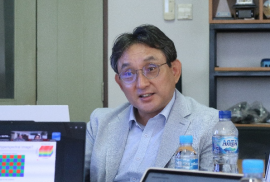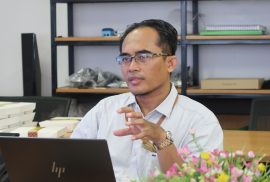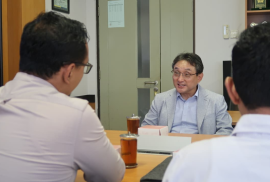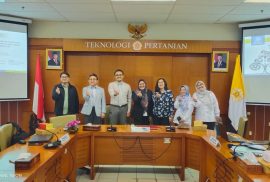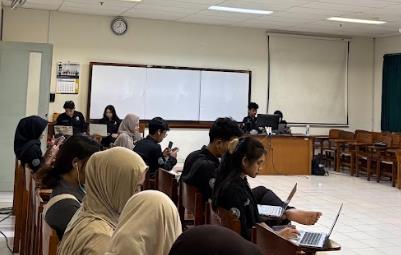
The Agricultural Engineering International Outreach (AEIO) 2025, organized by the Association of Agricultural Engineering Students (PERMATETA), Faculty of Agricultural Technology, Universitas Gadjah Mada, was successfully held on Saturday, 8 November 2025. The event took place in Room 102 of the Faculty of Agricultural Technology UGM and was connected via Zoom Meeting to facilitate international participation. A total of 68 participants from across Indonesia attended both offline and online, while around 30 international participants joined from Malaysia, Thailand, and Japan. This diverse composition underscores AEIO’s role as a global platform where agricultural engineering students collaborate to analyze and formulate solutions to pressing agricultural issues across countries.
Opening Session and Preliminary Materials
The event began at 08.30 WIB with participant registration and seating arrangements based on pre-assigned discussion groups. The committee ensured technical readiness, including audio systems, presentation displays, breakout rooms, and internet connectivity to provide an equal experience for all participants.
At 08.50 WIB, the event was officially opened by the Master of Ceremony, followed by remarks from the Committee Chair Irham Azizi Mahmudsyah, PERMATETA President Hazel Kianda Alfarabi, PERMATETA Advisor Dr. Prieskarinda Lestari, S.T., IPM., and the Head of the Department of Agricultural and Biosystems Engineering, Prof. Dr. Ir. Lilik Sutiarso, M.Eng., IPU. All speakers highlighted the importance of global collaboration in addressing agricultural challenges such as food security, climate change, digital transformation, and the declining interest of younger generations in agriculture.
The session continued with an introduction to PERMATETA by Hazel Kianda Alfarabi, followed by a presentation on Indonesia’s national profile by Paula Yosephine Ayu Miranda Silalahi. The material covered Indonesia’s cultural diversity, tropical agricultural characteristics, technological development, major commodities, and the country’s strategic role in regional agricultural issues.
Focus Group Discussion: Three Cross-Country Case Studies
The core of AEIO 2025 took place during the Focus Group Discussion (FGD) starting at 09.50 WIB. Participants were divided into offline and online groups to discuss three agricultural case studies from Indonesia, Malaysia, and Japan:
1. Cassava Price Crisis in Lampung, Indonesia
Groups 1 and 2 examined the root causes of the low cassava price, including high production costs, weak bargaining power of farmers, limited post-harvest innovation, and restricted access to digital technology. Proposed solutions included product diversification, IoT-based production monitoring, and blockchain-based contract farming to improve price transparency.
2. Rice Crisis and Flooded Paddy Fields in Kelantan & Terengganu, Malaysia
Groups 3 and 4 discussed the impacts of the 2024 major flood that led to massive crop failure. Solutions emphasized IoT-based irrigation systems, flood-tolerant rice varieties, the installation of Automatic Weather Stations (AWS), and greater investment in climate-adaptive agricultural research, including the development of sea water rice.
3. Challenges in Japan’s Agriculture: Labor Shortage and Climate Change
Groups 5 and 6 highlighted Japan’s aging farming population, with the majority averaging 68 years old. Recommendations included technology-based agricultural education, wider access to foreign labor, and expansion of AI and robotic agricultural systems. International collaboration was seen as crucial to accelerate agricultural modernization.
Presentation and Formulation of AEIO 2025 Solutions
Following the FGD, each group delivered a 30-minute presentation. The session produced the “AEIO 2025 Solution Formulation”, summarizing problem analyses, innovative recommendations, and opportunities for international academic collaboration. These included proposals for joint research projects, student exchange programs, and community service initiatives.
Participants also received insights into global mobility opportunities such as the SUIJI Exchange Program, student mobility programs, and credit-earning schemes.

Evaluation and Future Direction
Evaluation results show that AEIO 2025 ran smoothly on schedule, with excellent coordination and high participant engagement. Points for improvement include mismatches between registration and Zoom attendance, differing perspectives that prolonged discussions, and the need for better documentation quality in future events.
Overall, AEIO 2025 succeeded in expanding academic networks, strengthening international communication skills, and enriching students’ understanding of global agricultural challenges. By integrating multidisciplinary perspectives and modern agricultural technology, AEIO 2025 served as an important platform for students to contribute to more adaptive, resilient, and sustainable global agriculture.
The event is expected to grow further in the coming years with broader country participation, deeper discussion formats, and stronger involvement of international universities.
Contributor: Rahma Indira Azzahra

